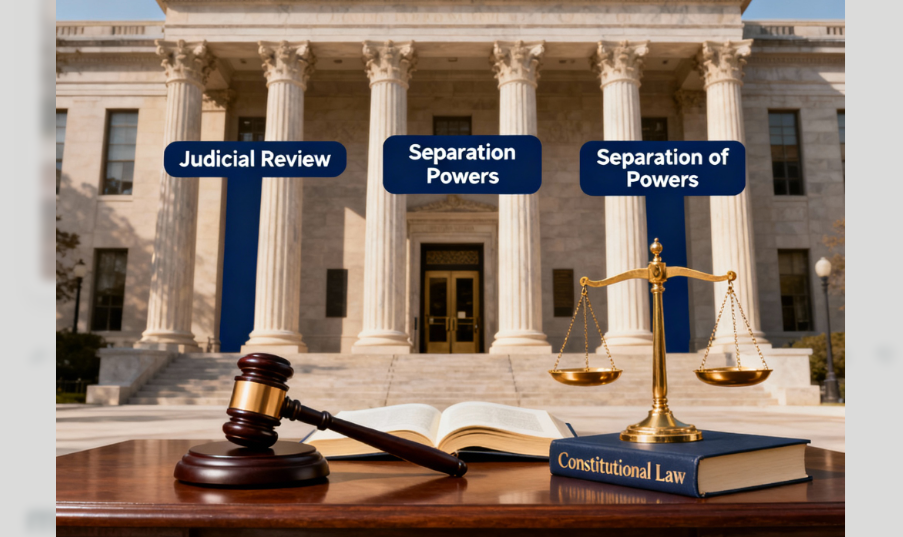Published on 27th June 2025
Authored By: Akaisha Saigal
Vivekananda Institute of Professional Studies
FACTS:
The case of In Re Delhi Laws Act, AIR 1951 SC 332, came to being against the background of India’s developing constitutional framework in the years following independence. Earlier, during the first few decades of British rule, the Government of India Acts, 1919 and 1935, laid the foundations for the administration of regions like Delhi. Through such acts, provisions were drafted under which an act of a provincial or central government could be applied to another region with modifications.
The Delhi Laws Act, 1912, stated that the Provincial Government may extend to Delhi any law in force in any portion of British India, subject to such modifications as it may think necessary. All consequent statutory provisions with similar delegation features took form with the Ajmer-Merwara (Extension of Laws) Act, 1947, and the Part C States (Laws) Act, 1950. These laws broadly spoke about the modification of laws or their repeal by the local executive, where such laws had been enacted originally with due regard to the needs of the area concerned by the legislature. Questions arose regarding the constitutional validity of such delegation of legislative power as the country developed into a democratic republic with a newly framed constitution.
The President of India, under Article 143(1) of the Constitution, referred three separate matters concerning constitutional validity of these delegate powers to the Supreme Court for everyone and whether (1) Section 2 of the Delhi Laws Act, 1912, rendered the Provincial
Government empowered to extend and modify the laws; (2) Section 2 of the Ajmer-Merwara (Extension of Laws) Act, 1947; and (3) Section 2 of the Part C States (Laws) Act, 1950 which authorized the extension, the amendment, and in certain instances the repeal of existing legislation could survive from the stricture of the principle of separation of powers.
The factual matrix of this case bears testimony to a legislative-executive interplay. While recognizing regional disparities, the legislature chose to delegate some of its legislative functions to the executive in formulating policies. Critics accused such delegation of undermining the principle that the formulation of law is an essential and exclusive prerogative of the legislative branch. Flexibility was, however, claimed by proponents for practical governance, and that reliance on legislative enactment would cause a hindrance to timely and context-sensitive administration. This conflict became central to the legal argument in the In Re Delhi Laws Act, which framed buffers between administrative expediency and the need to safeguard the core legislative function.
ISSUES:
The Supreme Court had interspersed the exclusive multidimensional constitutional inquiry involving the delegation of legislative power into this case. Here, the Court is called upon to consider whether the delegation of law-making power to the executive constituted a breach of the doctrine of separation of powers enshrined in the Indian Constitution.
Questions of importance can be compressed into the following core questions:
- Delegation of Power: The issue is whether delegating law-making powers to the executive under provisions like those in section 2 of the Delhi Laws Act allows the legislature not to exercise its core law-making powers. The further question was whether allowing the executive to amend laws, a function generally held by the legislature, betrays the tenets of accountability to the people.
- Extent of Delegated Authority: Were there any clear and adequate policy guidelines ensuring that the delegation did not become an abdication of the legislature’s essential functions? In particular, the Court had also considered whether the delegation was limited to administrative or “ancillary” functions, or if it was intruding upon the “core” of legislative decision-making.
- Validity of Repeal Powers: Was the reference to Section 2 of the Part C States (Laws) Act, 1950, that authorized the executive not merely to extend and modify laws but also to utterly repeal them, central to the question? The Court was called upon to determine if this repeal power was unconstitutionally wide.
At issue, as a broader constitutional inquiry, was whether or not there is an absolute “zone of non-delegation” in Indian law which allows no encroachment whatsoever on parliamentary powers in its exercise. In effect, the question was asked: Is the legislature constitutionally entitled to undertake a delegation that affects the substantive rights and legislative intent by allowing the executive to make consequential amendments to the law without due parliamentary intervention?
RULE:
Judicial pronouncement of On Re Delhi Laws Act has provided a landmark on the doctrine of delegated legislation and the limits of legislative power. The Court enunciated quite a few fundamental principles and rules which go on to significantly influence Indian jurisprudence in the following manner:
- Core Legislative Function: The Supreme Court noted that to the legislature devolved the ‘core’ duty of making laws-policy formulation, setting guiding principles, and enactment of laws reflecting the will of the people. This core function may not be surrendered to the executive; any delegation that encroaches upon this fundamental role would be unconstitutional per se.
- Permissible Delegation: The Court, however, reiterated the reality that some parts of legislative work are undoubtedly technical or administrative, for which, on practical grounds, necessary ancillary functions may be delegated by the legislature. Such a permissible delegation must conform to the following three guiding principles:
- Intelligible Principle Test: The legislature must lay down clear, intelligible guidelines so that the delegated power is exercised within defined boundaries.
- Limited Scope: The delegation should be confined to matters which are not essential or subsidiary, leaving intact the essential legislative framework.
- Prevention of Abuse: Adequate checks must be embedded within the statutory framework so that the abuse of the delegated power, especially regarding an uncontrolled executive authority, which could change the substantive law, is prevented.
- Distinction between amendment and repeal: The Court clarified that, though it may be permissible for the executive to amend laws in an administrative or supplementary manner, conferring on the executive the power of repeal or substitution of legislative enactments is a different matter altogether. Repeal or substitution is considered a core legislative function as it tends to change or abolish the statutory law representing the legislative intention.
- Judicial Role in Policing Delegation: The decision emphasized that it is the role of the judiciary to ensure that the statutory delegation does not cross constitutional boundaries. Courts would have to apply a “proportionality” approach to ascertain whether the extent of the delegation is proportionate to the need for administrative efficiency and whether adequate legislative oversight has been preserved.
Thus, the case built a permanent foundation for the evaluation of any future delegation of legislative power. The “intelligent principle” standard still ranks among the major tests for determining the constitutionality of delegated legislation in India.
ANALYSIS:
The judicial assessment of the In Re Delhi Laws Act is an apt balancing act between the necessities of contemporary governance and the constitutional mandates to which they are subject. While sections of the judgments pulled in different directions on some nuanced points, they had common bases that affirmed the legality of legislative delegation as long as they complied with the safeguards above.
- Judicial Divergence and the Spectrum of Views
- The Majority View:
For some, like the Chief Justice Mr. Kania, Justice Fazl Ali, et al., the idea of practical political necessity within the delegated legislation is built on the argument that the reality of constitutional framing also implied the necessity of having a proper administrative setup that would have been able to respond to some localized issues. As long as the guiding principle was present by way of a statement on legislative policy to be implemented by limited execution of non-core functions, the greater risk would be avoided. Such judges viewed that Sections 2 of the Delhi Laws Act and that of the Ajmer-Merwara Act do not contravene constitutional principles as they preserved the main function of the legislature to allow local conditions to the act. They added in their view that without some form of delegating power, the state will get caught in bureaucratic inertia from which it will be unable to extricate itself to meet the administrative challenges that an increasingly diverse society will raise.
- The Critical Minority:
Such as justices, Justice Das and Mukherjea had a much more cautious view. They said the greatest evil that could happen was that of the delegation of any power, particularly the power of the executive to repeal or substitute or obviate any law. Justice Das would add further that the power to repeal statutory provisions is within the course of the legislative process itself, and that power is transferred to the executive, which undermines the fundamental doctrine of separation of powers given in the Constitution. Justice Mukherjea highlighted that even if some technical changes could be permitted, the absence of strict policy guidelines for the executive on the Part C States (Laws) Act has taken too much latitude for action on the side of the executive, which would ultimately lead to arbitrary governance.
- Balancing Efficiency and Accountability
The analysis in In Re Delhi Laws Act is indicative of an attempt to draw a line between the prerogatives of democracy and the efficacy of administration. One of the most historic gains of this decision is the recognition that modern governance does not operate within the rigid walls of legislative procedures. Considering that there has been tremendous growth in the number of statutes after independence, and since it would be impossible to bring the weight of every delicate administrative decision to bear under the full legislative machinery, the executive would be rendered almost impotent.
- Influence on Administrative Law and Future Precedents
The In Re Delhi Laws Act ruling has created a deep and never-ending influence for the developing wings of administrative law in India. In subsequent and later cases, such as Ajoy Kumar Banerjee v. Union of India and Delhi Science Forum v. Union of India, courts have echoed the principles enunciated in this judgment. These have sufficed to hold that while procedural and technical matters could be conferred upon the executive, public policy and fundamental legislative decisions should exclusively rest with the legislature.
Apart from that, the decision kindles legislative ventures toward making sure that statutes incorporating delegated powers are contained within good safety walls. Such safety walls, for instance, include periodic reviews and requirements of elaborate legislative guidelines, which serve as the bulwark for safeguarding from uninhibited executive authority. The ‘intelligible principle’ standard has developed as a tremulous cornerstone of legal analysis into issues ranging from delegated legislation to administrative discretion.
- Critical Perspective on Judicial Reasoning
While the majority opinion is often lapped up in accolades for its pragmatism, certain legal scholars have criticized the judgment for not being particularly clear in distinguishing between an acceptable delegation and an unconstitutional surrender of legislative power. It is being argued that the judgment could have laid down much more specific standards for what constitutes an ‘intelligible principle’ to reduce ambiguity in future judicial reviews. The split views of the justices indicate the ever-present tension between the required flexibility for modern administration and the adhesive democratic principle of separation of powers.
Nevertheless, the Court mounted an essential check on executive discretion by specifying that the power to repeal or substitute laws should not be delegated. This aspect of the ruling continues to be cited as a major limitation upon administrative powers, ensuring that the legislature remains the supreme law-making body in the country.
CONCLUSION:
The decision in In Re Delhi Laws Act, AIR 1951 SC 332, flatters to deceive. The fact is, however, that this judgment is a watershed in Indian constitutional law because it enunciates the contours within which delegated legislation can operate. It was the moment in history when the Supreme Court had to draw the lines of permissible delegations, negotiating the course between the functional requirements of a modern, administratively efficient government and the constitutional imperative that law-making remains within the prerogatives of the legislature.
It found empirical justification in the obligatory delegation of some power by the legislation to the executive, especially in the case of a newly independent country, where so many regions had to be brought under one umbrella and swift, localized decisions were necessary. This, however, was constitutionally valid if the precise statutory limits were confined therein without any interference with essential functions of the legislature. The Supreme Court has thus laid down the doctrine of “essential legislative function,” holding that certain legislative powers-including the ones that draw policies, repeal or substitute laws, and transfer rights and obligations-cannot be imported or offloaded to the executive branch.
Another of its great contributions is the laying down of the test known as the intelligible principle. The ingredient of intelligible principle allows that any delegation of legislative power should be accompanied by proper guidelines or policy objectives within which directives will assist the executive in the exercise of the assigned authority. The intelligible principle causes such delegation not to be a brutum fulmen and makes the executive subject to a legally defined accountability. This principle has since become a keystone of the assessment of the constitutionality of delegated legislation within India, referred to in various cases, including Hamdard Dawakhana v. Union of India and Vasu Dev Singh v. Union of India.
This verdict also articulated the tension between administrative efficiency and constitutional propriety. Some judges, for example, were pragmatic: they preferred to allow wider delegations in the interest of smoother governance; others, they believed, in contrast, stressed the peril of overreaching of executive powers and a decline in democratic accountability. The opinions here gave rich insight into the problem, for this was by no means a simple issue, and Indian administrative law continued to evolve around it.
This case, which has greatly earned itself into the country’s historical annals, is that which in India will take the separation of powers a profound and possibly even more charged way forward than what the Constitution offered to the client countries of the United States. This Constitution in India permits very little separation, particularly regarding functional overlap between the legislature and executive. In Re Delhi Laws Act, then, it would clear the air that some degree of constitutional permissibility may exist between the two, but at the same time, helmets are required to be built to tackle the erosion of legislative authority.
The lasting significance of the case is what it boils down to? The principles derived from the case then offer the judiciary a very robust framework to police the boundaries of executive action as the Indian administrative state continues to burgeon in scope and complexity. It remains the touchstone to consider when testing the legality of statutory instruments and executive decisions so that the supremacy of Parliament and democratic ethos of the Constitution are preserved amid ever-changing sociopolitical and administrative conditions.
REFERENCES
- In re Delhi Laws Act, AIR 1951 SC 332.
- Ajoy Kumar Banerjee v. Union of India, (1984) 3 SCC 127.
- Delhi Science Forum v. Union of India, (1996) 2 SCC 405.
- Hamdard Dawakhana v. Union of India, AIR 1960 SC 554.
- Vasu Dev Singh v. Union of India, (2006) 12 SCC 753.
- India Const. art. 143(1)




